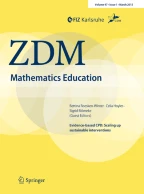Abstract
We analyzed how algebraic concepts and representations are introduced and developed in the Chinese, South Korean, and Singaporean elementary curricula, and in selected Russian and U.S. elementary curricula. In all five curricula, the main goal for learning algebraic concepts is to deepen students' understanding of quantitative relationships, but the emphases and approaches to helping students deepen their understanding of quantitative relationships are very different. Based on the analyses of the five curricula, we discuss four issues related to the development of algebraic thinking in earlier grades: (1) To what extent do curricula expect students in early grades to think algebraically? (2) What level of formalism should we expect of students in the early grades? (3) How can we help students make a smooth transition from arithmetic to algebraic thinking? and (4) Are authentic applications necessary for students in early grades?
Kurzreferat
In dem Beitrag wird analysiert, wie algebraische Begriffe und Repräsentationen in Grundschulcurricula aus China, Russland, Südkorea, Singapur und USA eingeführt und entwickelt werden. In allen fünf Curricula besteht das Hauptziel des Lernens von algebraischen Begriffen darin, das Verständnis von Lernenden hinsichtlich quantitativer Beziehungen zu vertiefen. Jedoch sind die Schwerpunkte und die Ansätze der fünf Curricula zur Vertiefung des Verständnisses der Schülerinnen und Schüler von quantitativen Beziehungen sehr unterschiedlich. Auf der Basis der Analysen dieser fünf genannten Curricula diskutieren wir vier Themen in Zusammenhang mit der Entwicklung von algebraischem Denken in unteren Jahrgangsstufen: (1) Inwieweit erwarten Curricula von Lernenden in unteren Klassenstufen, algebraisch zu denken? (2) Welchen Grad an Formalismus dürfen wir bei Lernenden der unteren Klassenstufen erwarten? (3) Wie können wir Lernenden zu einem angemessenen. Übergang von arithmetischem zu algebraischem Denken verhelfen? und (4) Sind authentische Anwendungen für Lernende der unteren Jahrgangsstufen erforderlich?
Similar content being viewed by others
References
AAAS (2000): Algebra for all: Not with today's texbooks. See www.project2061.org/newsinfo/press/r1000426.htm
Cai, J. (2004a): Introduction to the special issue on developing algebraic thinking in the earlier grades from an international perspective.—In: The Mathematics Educator (Singapore), 8(No.1), p. 1–5
Cai, J. (2004b): Developing algebraic thinking in the earlier grades: A case study of the Chinese mathematics curriculum. —In: The Mathematics Educator (Singapore), 8(No. 1), p. 107–130
Carpenter, T. P.; Franke, M. L.; Levi, L. (2003): Thinking mathematically: Integrating arithmetic and algebra in elementary school. Portsmouth, NH: Heinemann
Curriculum Planning & Development Division (2000): Mathematics syllabus primary.—Singapore: Ministry of Education
Davydov, V. V.; Gorbov, S. F.; Mikulina, G. G.; Saveleva, O. V. (1999): Mathematics: class 1. J. Schmittan (Ed.)— Binghamton, NY: State University of New York
Division of Elementary Mathematics (1999): Mathematics: Elementary school textbook (number 1).—Beijing, China: People's Education Press
Driscoll, M. (1999): Fostering algebraic thinking: A guide for teachers grades 6–10.—Portsmouth, NH: Heinemann
Freeman, D. J.; Porter, A. C. (1989): Do textbooks dictate the content of mathematics instruction in elementary school?—In: American Educational Research Journal, Vol. 26, p.403–421
Kaput, J. (1999): Teaching and learning a new algebra. In: E. Fennema; T. Romberg (Eds), Mathematics classrooms that promote understanding, Mahwah, NJ: Erlbaum, p. 133–155
Kieran, C. (2004): Algebraic thinking in the early grades: What is it?—In: The Mathematics Educator (Singapore) 8(No. 1), p. 139–151
Lew, H. C. (2004): Developing algebraic thinking in the earlier grades: A case study of the South Korean elementary school mathematics curriculum.—In: The Mathematics Educator (Singapore) 8(No. 1), p. 88–106
Mathematical Sciences Education Board (1998): The nature and role of algebra in the K-14 curriculum: Proceedings of a national symposium.—Washington D.C.: National Research Council
Moyer, J. C.; Huinker, D.; Cai, J. (2004): Developing algebraic thinking in the earlier grades: A case study of the U.S. Investigation series.—In: The Mathematics Educator (Singapore) 8(No. 1), p. 6–38
National Council of Teachers of Mathematics. (1989): Curriculum and evaluation standards for school mathematics.—Reston, VA: Author
National Council of Teacher of Mathematics (2000): Principles and standards for school mathematics.—Reston, VA: Author
Ng, S. F. (2004) Developing algebraic thinking: A case study of the Singaporean primary school curriculum.—In: The Mathematics Educator (Singapore) 8(No. 1), p. 39–59
Post, T. R.; Behr, M. J.; Lesh, R. (1988): Proportionality and the development of prealgebra understandings.—In: A. Coxford; A. Shulte (Eds.), The ideas of algebra, K-12. Reston, VA: NCTM (1988 Yearbook), p. 78–90.
Russell, S. J.; Economopoulos, K.; Murray, M.; Mokros, J.; Goodrow, A. (1998): Implementing theInvestigations in Number, Data, and Space curriculum: Grades K, 1 and 2.— Menlo Park: CA: Dale Seymour Publications
Schifter, D. (1999): Reasoning about operations: Early algebraic thinking in grades K-6.—In: L. V. Stiff, F. R. Curcio (Eds.), Developing mathematical reasoning in grades K-12. Reston, VA: NCTM (1999 Yearbook), p. 62–81
Schmidt, W. H.; McKnight, C. C.; & Raizen, S. A. (1996): Characterizing pedagogical flow: An investigation of mathematics and science teaching in six countries.—The Netherlands: Kluwer Academic Publishers
Schmidt, W. H.; McKnight, C. C.; Houang, R. T.; Wang, H.; Wiley, D. E.; Cogan, L. S.; Wolfe, R. G. (2002): Why schools matter: A cross-national comparison of curriculum and learning.—San Francisco, CA: Jossey-Bass
Schmittau, J.; Morris, A. (2004): The development of algebra in the elementary mathematics curriculum of V. V. Davydov.— In: The Mathematics Educator (Singapore) 8(No. 1), p. 60–87
Silver, E. A.; Kenney, P. A. (2001): Results from the sixth mathematics assessment of the National Assessment of Educational Progress.—Reston, VA: NCTM
Stacey, K.; Chick H.; Kendal M. (2004): The Future of the Teaching and Learning of Algebra: The 12th, ICMI Study.— The Netherlands: Kluwer Academic Publishers
Usiskin, Z. (1995): Why is algebra important to learn?—In: B. Moses (Ed.), Algebraic thinking in grades K-12: Readings from NCTM's school-based journals and other publications. Reston, VA: NCTM, p. 16–21.
van Dooren, W.; Verschaffel, L.; Onghena, P. (2002): The impact of preservice teachers' content knowledge on their evaluation of students' strategies for solving arithmetic and algebra word problems.—In: Journal for Research in Mathematics Education, Vol. 33, p. 319–351
